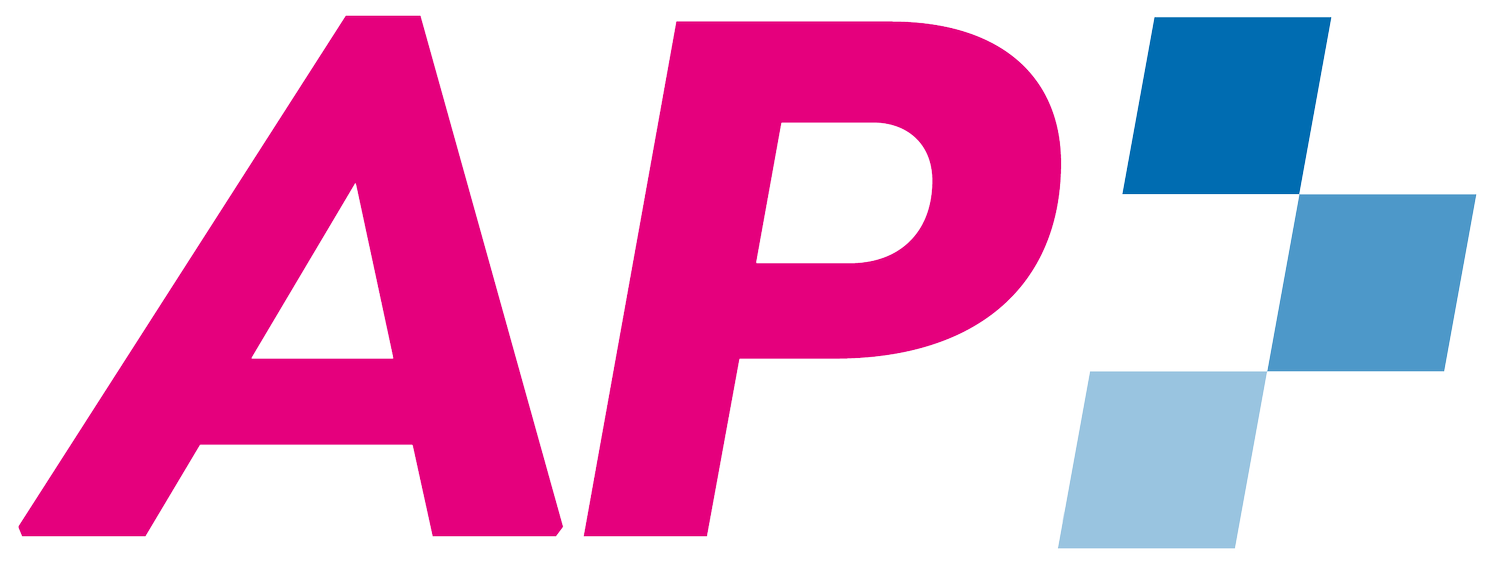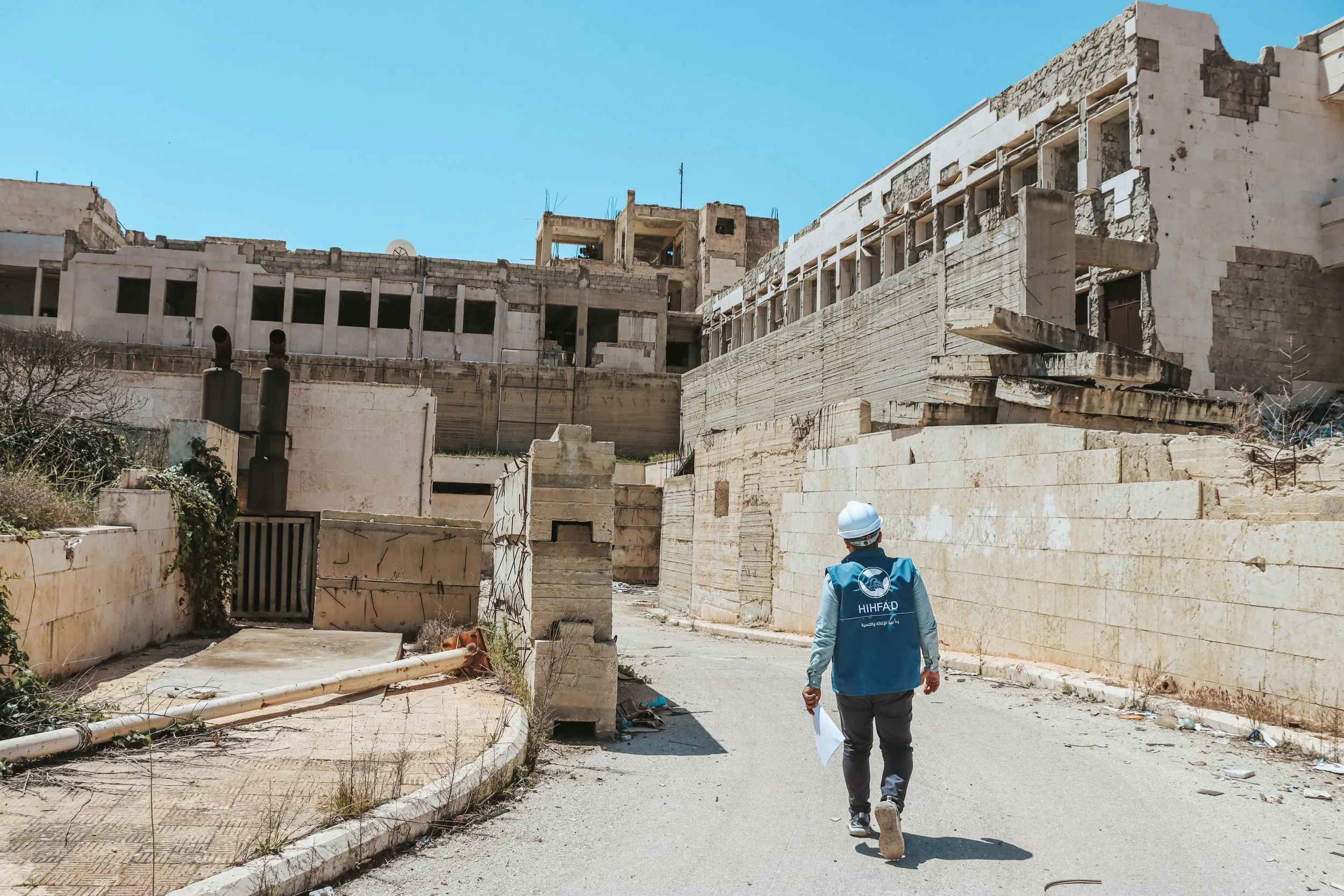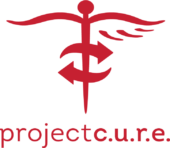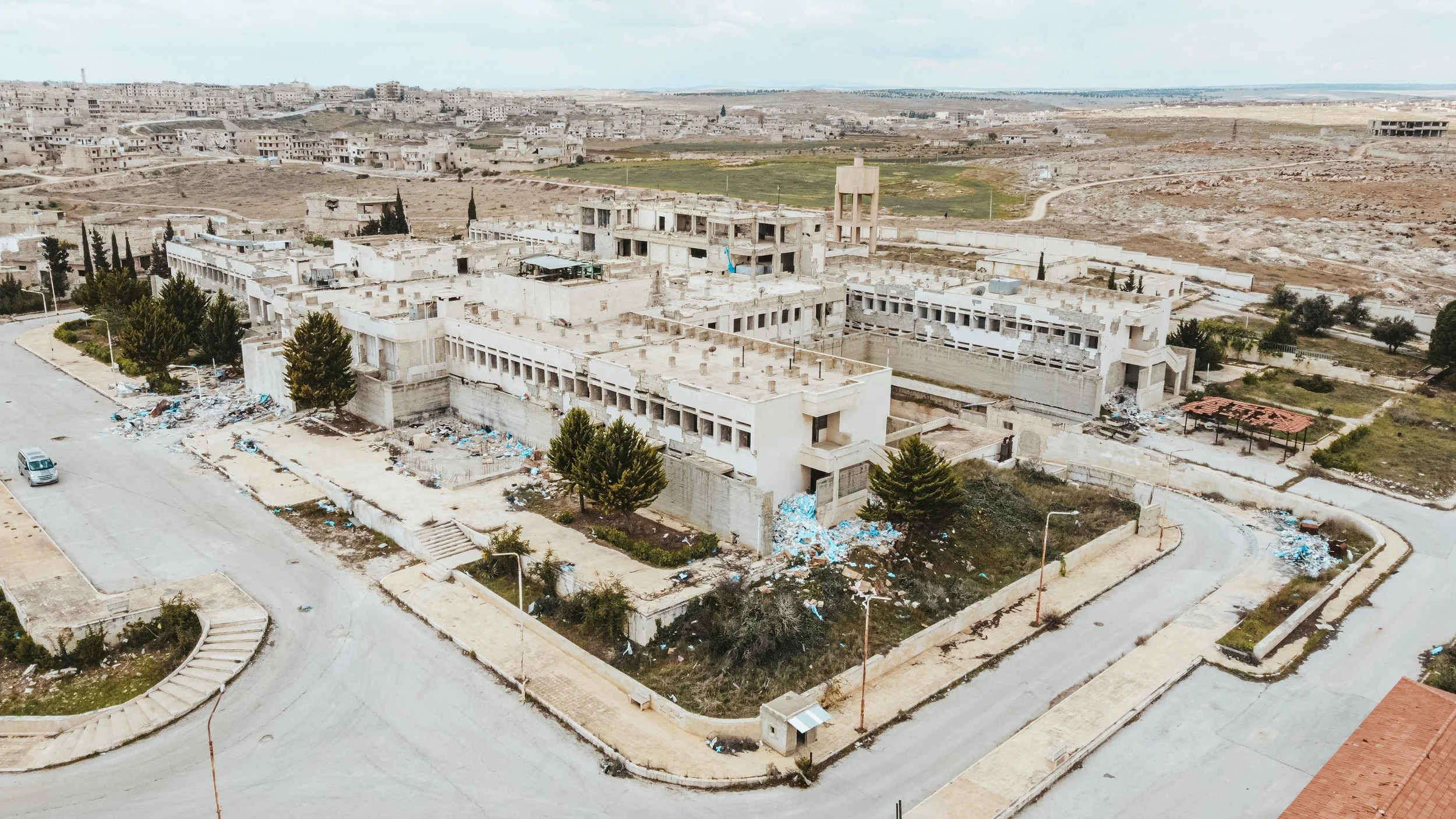
Art for Syria
Aerial view of Maarat al-Numan Hospital’s current state
This charity auction supports critical healthcare recovery in a country still reeling from more than a decade of war. Although the collapse of the Assad government in late 2024 marked a turning point, Syria’s humanitarian emergency is far from over. Today, 16.5 million Syrians still require urgent humanitarian assistance, more than half the population remains displaced and 40% of hospitals and health facilities continue to operate at reduced capacity or remain completely non-functional.
For the millions of Syrians who have endured years of conflict, regime change alone cannot heal wounds that run deep into the country's infrastructure and social fabric. Healthcare systems that were already stretched before the political transition now face the additional challenge of serving populations in newly accessible areas while managing ongoing displacement and resource scarcity.
Your bid and donation for our Art for Syria auction directly supports the restoration of essential healthcare in Northwest Syria. Through a combined focus on medical supplies and solar energy systems, we help hospitals secure both the equipment and the reliable electricity they need to function. This means powering incubators and intensive care units, keeping vaccines refrigerated and ensuring critical services are within reach.
At it’s core, this support means thousands of Syrians will be able to access the care they deserve to rebuild their lives.
Why it matters
16.5M
people are in need of humanitarian assistance, representing the highest number since the onset of the conflict. (Source)
40%
of hospitals and health facilities are partly or completely non-functional, with 77 recorded attacks on healthcare facilities since 2024. (Source)
2-4 hrs/day
is all the electricity Syrians are currently able to access after the conflict have crippled the national grid, leaving hospitals in chronic energy insecurity. (Source)
Rebuilding Northwest Syria
Northwest Syria has been among the hardest-hit regions of the conflict. Largely outside regime control for over a decade, its towns endured relentless airstrikes, sieges, and waves of displacement. Hospitals were deliberate targets, including the Ma’arrat al-Numan National Hospital, leaving millions without reliable access to care.
As Syrians return, the region still faces immense challenges: scarce resources, overcrowded camps and shattered infrastructure. Aid Pioneers has worked in northwest Syria for years, including during the 2023 earthquake, delivering emergency medical supplies. This project builds on that foundation.
While international attention largely focuses on Syria’s major cities like Aleppo or Damascus, rural and smaller urban centers in the northwest continue to serve hundreds of thousands with far fewer resources. With Art for Syria, we aim to help close that gap and ensure these communities receive the care they deserve.
Hospitals we will be supporting include:
Ma’arrat al-Numan National Hospital
Before its destruction, Ma’arrat al-Numan National Hospital was a medical lifeline for as many as 300,000 people, providing around 25,000 medical services every month. Situated along the Damascus–Aleppo highway, it was strategically placed to serve many of the surrounding areas. Repeated airstrikes between 2017 and 2019 left the hospital in ruins, its wards reduced to rubble and equipment looted.
As reconstruction has begun, the restoring of this hospital represents reopening a door for displaced families to return with a sense of safety. With a planned capacity of 200 beds and a comprehensive set of departments, its revival will once again be an anchor of healthcare for the entire southern Idlib region.
Take a closer look at the hospital and the rebuilding effort, including the damaged electrical systems and ongoing infrastructure work.
University Hospital of Idlib (formerly Avicenna)
Unlike Ma’arrat, the University Hospital of Idlib is still operational, but its challenges are enormous. Serving over 185,000 patients per month with just 70 beds, the hospital is stretched to its limits.
Energy insecurity is one of the biggest challenges as it in recent years has seen critical devices been damaged by unstable electricity and vaccines have spoiled for lack of proper refrigeration.
Annually the hospital spends more than $111,000 on diesel — a cost that could otherwise be diverted into patient care.
By installing a solar system, we can ensure stable, clean power for essential services: keeping vaccines safe, powering intensive care units and providing reliable electricity. Over the next 10 years, this system will enable an estimated 75,000 additional treatments, generate €173,688 in cost savings and prevent 50 tons of CO₂ emissions.
Our Solution
In collaboration with our long-term local partners HiHFAD and SAMS, we are strengthening healthcare in northwest Syria through a dual focus: reliable electricity and essential medical supplies. Energy and equipment are two sides of the same coin: power enables treatment, and supplies make that treatment possible. Addressing both at once means hospitals can function as true lifelines for their communities.
Like many countries across the Middle East and Africa, prolonged blackouts lasting days or even weeks are common. Power plants depend on oil and gas, sources that are vulnerable to sanctions and steep, unstable pricing — leading to chronic fuel shortages.
Solar energy offers a sustainable way out of this cycle. With an abundance of sunlight, solar provides a predictable and nearly free energy source once installed. Instead of draining scarce funds on costly fuel just to keep the lights on, hospitals will be able to focus resources on what truly matters: treating patients and saving lives.
Our approach combines high-grade German solar technology with carefully selected and targeted medical supplies, made possible by our international network of trusted partners. This partnership model ensures efficiency, transparency and impact. That way every euro raised is translated into lasting improvements for patients and health workers on the ground.
Photograph from the Neonatal Intensive Care Unit (NICU) at The University Hospital of Idlib. Captured by Brian Lally.
Our network of partners
Aid Pioneers believe that lasting impact comes from working hand in hand with local communities and non-profits. Their deep knowledge ensures our solar solutions are tailored, sustainable and truly meet local needs.
For this project, we are proud to partner with the Syrian American Medical Society (SAMS). SAMS has since 2011 provided life-saving medical care to Syrians affected by conflict. Operating in Syria and neighboring countries, SAMS offers health services, emergency response and mental health support.
Hand in Hand for Aid and Development (HIHFAD) is our other Syrian implementation partner, that provides essential on-the-ground support. The organization envisions a world where barriers are dismantled and communities are empowered and self-reliant.
Earlier this year, we worked with them to deliver a 7,640 kg shipment of life-saving supplies to Northwest Syria, which enabled more than 1,400 additional ICU days across hospitals and clinics.
You can read more about that project here.
Through our longterm partnership with Project C.U.R.E., the largest provider of donated medical supplies worldwide, we are able to source medical supplies from warehouses across the United States.
These warehouses are stocked with over 350,000 square feet of medical items —everything a hospital needs to provide critical care.
For this auction, we are happy to partner with Enpal, one of Germany’s leading solar suppliers, to deliver high-quality, cost-effective solar solutions.
By leveraging our corporate network and in-house solar expertise, we are able to build world-class systems at 70% less than local vendor quotes - backed by 10+ year warranties for lasting reliability.
Make a difference
Your support powers both art and healing.
Explore the art catalog and place your bid online, knowing that every winning bid helps restore lifesaving care in Syria.



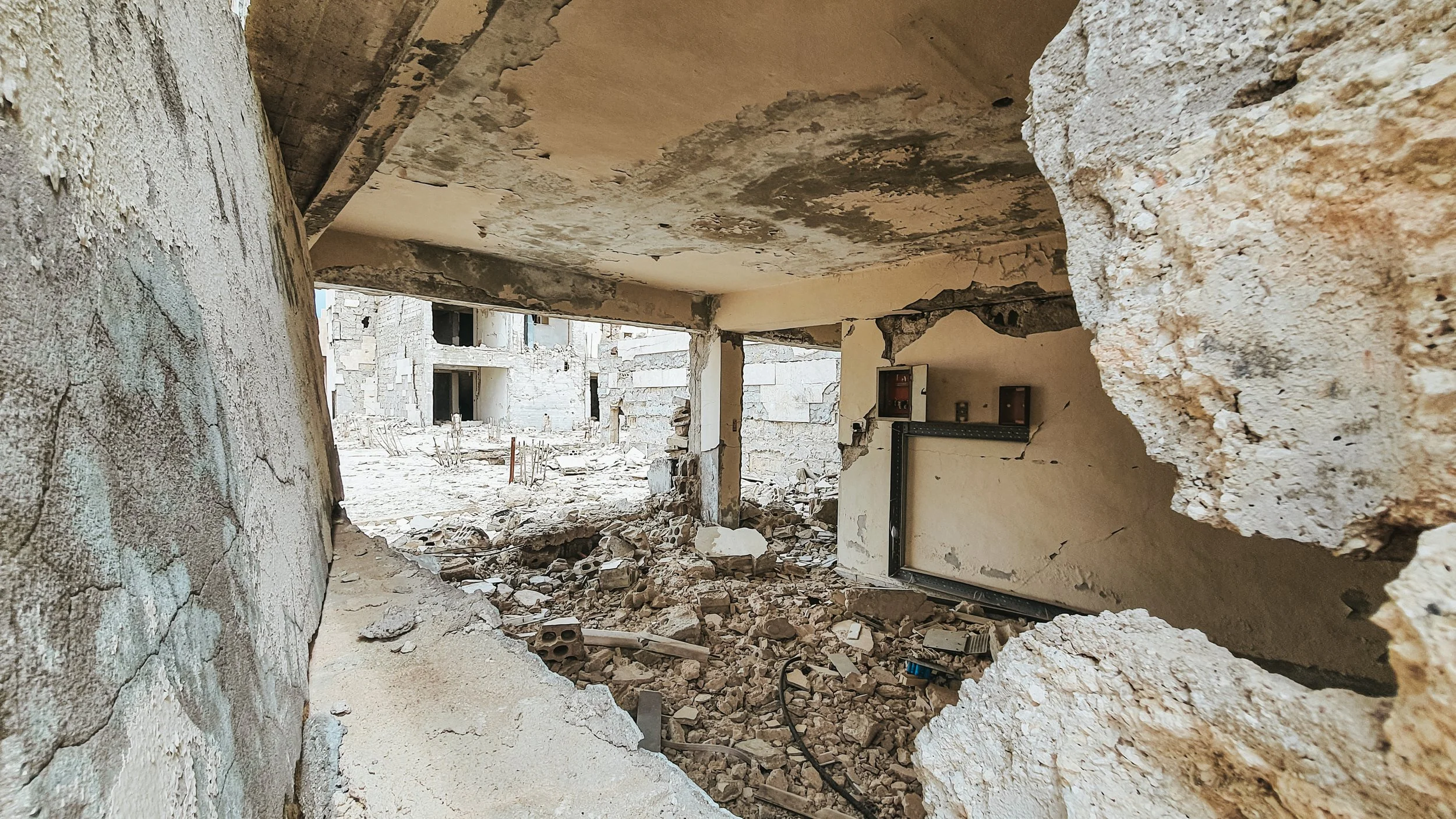
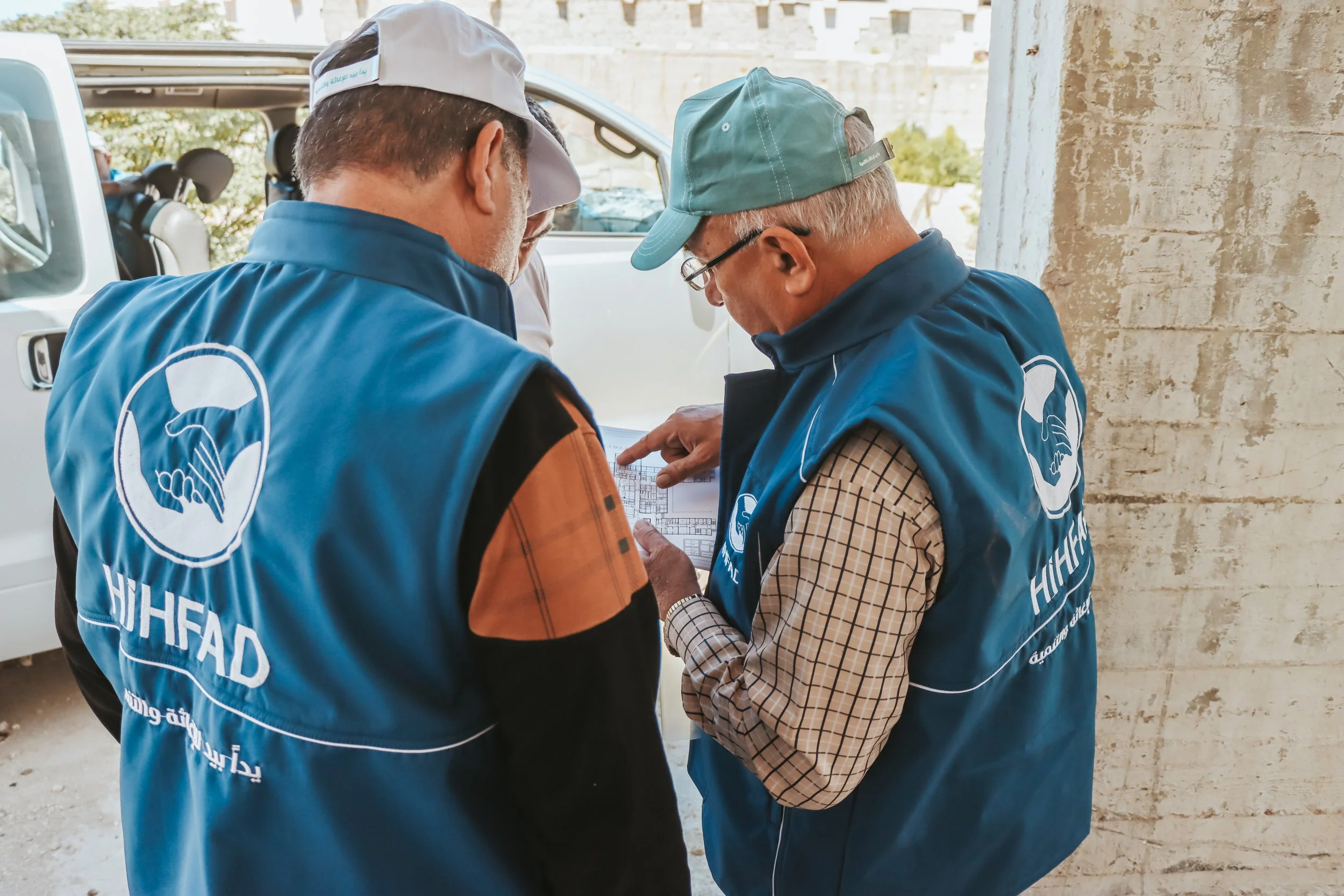






Photo carousel showcases scenes from Ma’arrat al-Numan National Hospital, the University Hospital of Idlib as well as other facilities we supported with medical supplies earlier this year. Photograhs by HiHFAD and Brian Lally.

